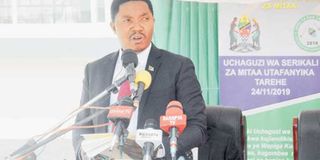It’s all systems go as govt unveils civic polls details

Minister of State in the President’s Office Regional Administration and Local Government (PORALG) Selemani Jafo, speaks in Dodoma yesterday on local government elections . PHOTO | THE CITIZEN PHOTOGRAPHER
What you need to know:
- Jafo says they have already completed the process of making regulations - and that the local government elections will be held in three months’ time.
Dar es Salaam. Local government elections in Mainland Tanzania will be held on November 24, the government announced yesterday.
Minister for State in the President’s Office Regional Administration and Local Government (PO-RALG) Selemani Jafo said the date has been set after concluding the process of preparing regulations, procedures and guidelines of the elections that were last held in 2014.
Addressing regional commissioners from all regions across the country, Mr Jafo said the government has already been published the regulations in both Kiswahili and English newspapers.
“According to Regulation 4 (1) (ii) (iii) and government announcements number 371, 372, 373 and 374 of 2019, I would like to inform the public and political parties with permanent registration that November 24, 2019 will be the local government election day in Mainland Tanzania,” he said, adding that the exercise will begin at 8am to 4pm.
He said according to regulations, election campaigns will be held for seven before the election day, noting that political parties are required to submit campaign schedules to assistant election supervisors not less than seven days before campaigns commence.
Mr Jafo said, according to regulations, candidates ought to be sponsored by political parties with permanent registration.
“The parties have to nominate their candidates 17 days before the polls and all unsatisfied candidates will have to file petitions at a referral committee formed in every district, from members picked seven days before the appointment,” he said.
Mr Jafo added that only eligible citizens will contest in the elections and they will be required to collect and fill in nomination forms 26 days before the polls. He said the forms will have to be returned seven days after being collected.
According to him, regulations suggest that incumbent leaders will cease to serve in their respective capacities, seven days before the process of collecting forms begins.
The minister clarified that election supervisors were supposed to issue election directives 62 days before the polls and that public servants will be picked to prepare a list of voters, 52 days before the election.
Besides, he said voters’ registration will start on the 47th day before the election day and will take place within seven days.
“Regulations require that voters registration should be carried out in public facilities or at any other building if the area had no government building, but upon agreement between election assistant supervisor and leaders of political parties,” he stressed.
The minister said positions that will be contested include, chairmen of hamlets, streets, and villages in respective towns and district councils.
According to him, members of the hamlet, street and village councils, members of the mixed village committee, those from a group of women in the town and district councils will also be elected during the forthcoming elections.
He outlined responsibilities of the office of regional commissioners as coordinating distribution of equipment, ensure councils have enough equipment, identify councils with surplus equipment and those with deficit for each to have enough equipment.
According to him, the office of the regional commissioner will also be charged with providing assistance in finding solutions to challenges facing councils and ensure the process security was maintained in all councils throughout the election process.
“Councils are responsible to announce administrative election areas, inform the public about contents of guidelines, identify voter’s registration and polling stations and appoint election assistant officers in wards, villages, hamlets and streets,” he said adding.
“The councils will also be responsible with the provision of public education to citizens, preparing a list of voters, appoint candidates for contested positions in the villages, streets and hamlets.”
For his part, the PO-RALG permanent secretary Joseph Nyamuhanga said the 2019 Local Government Elections will be held in 12,319 villages, 4,264 streets and 64,384 hamlets.
“The PO-RALG in collaboration with stakeholders has completed election preparations and that procurement of equipment for local government elections is underway.




